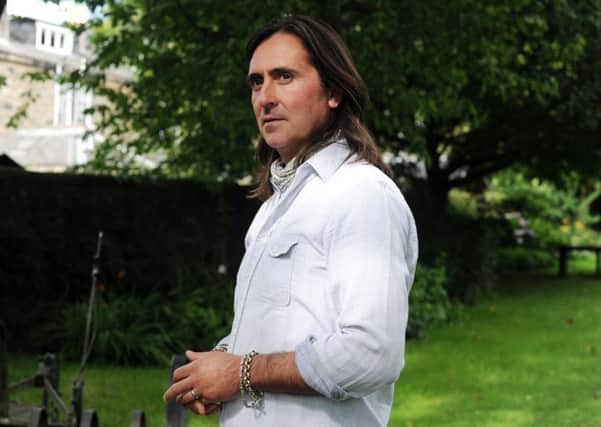Kirsty Gunn: Fearful, divided Scotland risks becoming like poet's abusive father


Any political conversation is instead instantly gobbled up by an ugly nationalist versus unionist polemic where one is either “for” Scotland or otherwise immediately defined as being against.
What’s more, it seems that everything must be political now – as the unpleasantness over Oliver’s appointment shows. “Of course, NTS has the right to select whoever it wishes but someone with a track record of criticising around half of Scotland’s population seems a strange choice to try to then unite them behind such an important organisation,” the SNP MSP James Dornan leapt in with, at the first moment, igniting a petition from “thousands” of pro-independence voters calling for Oliver to step down. But how can we look at an issue in the round if everything must be made so black and white? How to discuss, both rationally and imaginatively, the future of our publically funded cultural bodies when we have politicians stirring the discussion from the outset with their own agendas in mind?
Advertisement
Hide AdAdvertisement
Hide AdMany years ago, the poet John Burnside told me something that has stayed with me ever since. He was talking about a memoir he’d written about his father, a difficult thing to do, remembering a man who had been given to violent outbursts and unpredictability, who was a terrifying sort of role model for a boy to have. Yet, really, it was his father who was scared, John said. His father had had an awful life, full of sadness and tragedy, and “fear so often turns into violence”, were his words.
He went on to talk about that same capacity for an ugly sort of transformation being rife within the Scottish psyche. Going from being uncertain and frightened about something, to being really, really antagonistic towards it. “Think about it,” John said, as poets always ask us to do.
Certainly the hideous outcries following Oliver’s appointment – from both sides of the debate, Yes and No voters alike – have had me thinking. For the row has shown, in the most lurid terms, how the uncertainty and fear which the constant threat of a second referendum has awakened within our nature has resulted in a society that seems to be running on nothing but unpleasantness, prejudice and insult.
How can we get ahead, as a nation, how do anything – creatively and productively and intelligently – when complex issues are reduced to contorted dichotomies? “Yes” or “No”. The independence “issue” has certainly steamrollered any other kind of debates we might be having.
You’re either with me, or you’re against me, as the independence rhetoric has it – an idea, of course, that is already enshrined in the Scottish mentality.
The same kind of thinking, incidentally, that some might say did a very good job of holding us up for hundreds of years while we were caught fast – in the Highlands especially – in a sort of Ancien Regime sensibility that was played out in endless clan feuds and raids.
These may have been monumental at the time – my Granny put us to sleep with bedtime stories of the Gunns and the Keiths – but were ultimately unproductive, weren’t they? I sometimes think, with my fanciful novelist’s hat on, that it was no wonder the proscription of Highland dress and the clan system was so massively and swiftly successful. The population was already so divided by internecine jealousies and strife that it had exhausted itself. In the same way was the Reformation able to make such quick work of the mess. Only a culture with more on its mind than “You” versus “Me” can keep culture alive. One that celebrates only pitchfork politics – such as SNP councillor Mhairi Hunter tweeting that “people should look at the plus side of Neil Oliver getting a top job with the National Trust, he will have to shut up about politics” – is one that is dead on the ground. I don’t watch TV really but I’ve seen one or two of Oliver’s programmes on the history of Scotland and I think he’s terrific. People like him and the wonderful Fiona Watson, who I had the fun of working with a bit at Dundee, bring history to life. Their enthusiasms and commitment and sense of imagination are contagious; they endeavour to put themselves into the mindset of the people who inhabited the past, surrounding themselves with an understanding of their material worlds. This is wonderfully engaging and educational, both: great entertainment that’s also thoughtful fact-massing which we can go on to use in our own deliberations and discussion. What’s not to like?
Advertisement
Hide AdAdvertisement
Hide AdVigour of enquiry and debate, the active exercise of individual intelligence and judgement – one wants to believe that these qualities of the Enlightenment, bought at such a high price when we consider the spiritual values that were lost to it, might have taught us to do a better job at building a nation and deliberating its cultural worth. But alas, it’s mud-slinging and defamation on social media. It’s shameful that we’re in a position now whereby interesting appointments that raise the profile of cultural institutions should be read, like everything else, within the narrow terms of our governing party. What’s that phrase Creative Scotland have, describing exactly this sort of thing? That art must have “benefit to the Scottish people”? It’s more of that ‘you’re either for us or against us’ thinking. Poets like John Burnside writing memoirs about their fathers that show a rather grim side of small town Scottish life and their dark small-minded patriarchs had better watch out. If Oliver doesn’t suit the remit today it might be the poets who don’t tomorrow.
At the rate we’re going, Trump might march straight off the green of that vulgar, hubristic, environmentally damaging golf course of his and take over the whole country. We’d be too busy saying “you’re wrong” to each other to even notice.